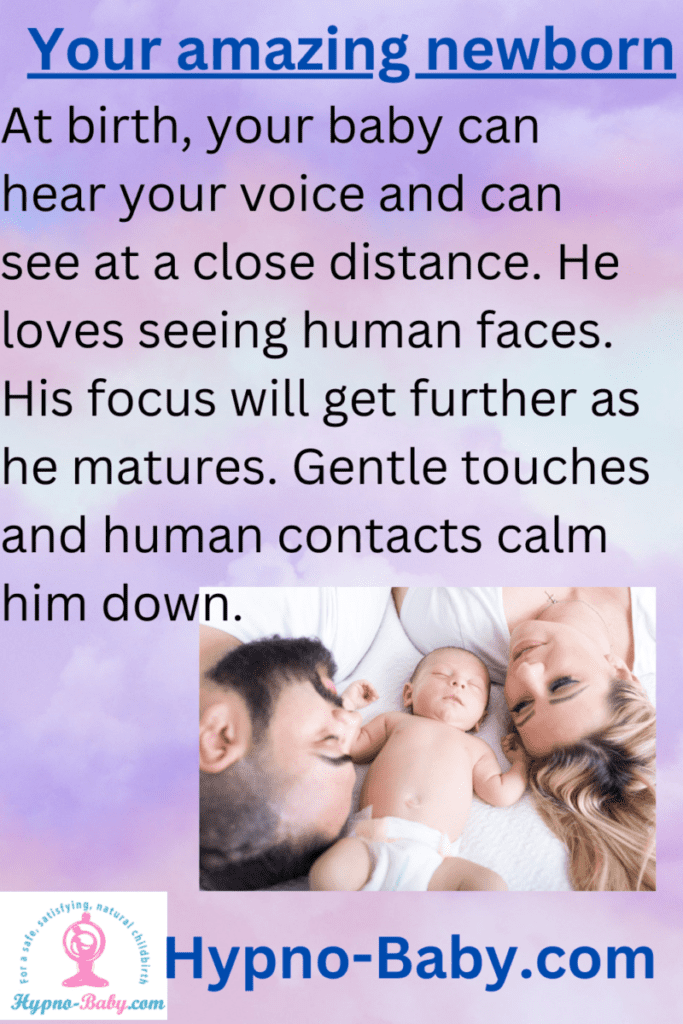Your baby’s 5 senses at birth: everything you should know
Vision (sight): Can my baby see at birth?
When parents learn that they are expecting a new baby, they often spend hours researching all of the new information they need to know. One of the most common questions that parents ask is, “Can my baby see at birth?” This is a valid question, as newborns are born with sight that is still developing. To answer this question and provide parents with the information they need, we must first discuss the anatomy of the eye and how vision develops in newborns. In this blog post, we will discuss the basics of newborn vision. We will look at the anatomy of the eye, the development of vision in newborns, and the signs to look for to determine if your baby is having trouble seeing. We will also discuss the importance of regular eye exams and how to best care for your baby’s vision. By the end of this blog post, you should have a better understanding of your newborn’s vision and how to ensure they have healthy sight as they continue to grow.
Your baby’s vision is funtional at birth but he is neasighted meaning he can see from a close distance.
He enjoys human faces more than anything according to medical studies. His focus will gain in distance as times goes by. For now though, at birth, he can see his mother’s face when breasfeeding or when held in dad’s arms and that is the most important thing.
His newborn exam will include checking the “red reflex” to make sure he does not have congenital cataracts which need immediate attention.
It is normal for a young baby to be crossed eyes from time to time as his eye muscles can be weak. Make sure to have your doctor check this and you can gently put your hand a couple of inches in front of your baby’s eyes when they are crossed. That will usually have him refocus and his eyes are going to realign.
Hearing: Can my baby hear at birth?
Your baby has been hearing ever since he was in the womb. That is the reason some people put headphones on the mother’s belly when she is pregnant and play classical music. But don,t expect your baby to become a genius from that alone. You have way more work to do!
Every new parent’s first question is, “Can my baby hear at birth?” The answer is yes unless your baby was affected by a disease like rubella which is rare or a congenital problem. There are a variety of factors that determine a newborn’s hearing ability, including their overall health and any potential health conditions they may have. While most babies are born with perfectly normal hearing, others may have an abnormal hearing level, or even a complete hearing loss. To understand the answer to this important question, it is important to understand the different ways a baby’s hearing can be evaluated, as well as the possible causes of hearing loss in newborns. There are various methods used to determine hearing ability. There are different causes of hearing loss, various tests and evaluations used to determine hearing ability, and what parents can do if their newborn does not pass their hearing tests.
Pay close attention to your baby. If his arms open up suddenly when there is a noise, that might be a sound of good hearing.
Do not worry on the fact that when tired, babies can sleep in a very noisy environment and that does not mean he has any kind of hearing problem. We actually should envy this capacity or turning everything OFF when needed.
Discuss with your doctor if you are concerned about your baby’s hearing as he can check or send you for further gentle testing.
Taste: can my baby taste at birth?
When it comes to understanding the mysteries of human development, few topics are as captivating as the question of when and how our senses are developed. Tasting is one of the most important senses for humans, and as parents, we often wonder if and when a newborn baby can taste. This blog post will explore the process of taste development in infants, discuss the role of taste in a baby’s growth and development, and answer the questions of whether or not a newborn can taste and if so, how early can it taste? We’ll also delve into the fascinating topic of flavor preferences and the impact of a baby’s taste development on the foods they choose to eat later in life. While the answers to these questions may not be as straightforward as we’d like, understanding the process of taste development in infants can give us important insight into our own baby’s development.
Your baby can taste from birth. He prefers sweet flavors to sour ones for sure. He enjoys sucking on glucose water but that is not the best food for him. Your breasmilk is the ideal food and it has the exact amount of nutrients your baby needs according to his age!
Olfactory: can my baby smell at birth?
As new parents, it is natural to have many questions and concerns about the health and well-being of your newborn baby. One of the most common questions parents have is if their baby can smell at birth. While it may seem like a simple question, the answer is actually quite complex. In this blog post, we will explore the science behind a baby’s sense of smell and discuss the various factors that can affect their ability to smell. We will also explain the importance of a baby’s sense of smell and the potential impact it can have on their overall health and development.
Yes your baby can smell at birth. Babies will turn toward smells they favor and turn away from bad odors.
Sensory: can my baby feel touch at birth?
The moment your baby is born, their senses start to be engaged. Even from the moment they are born, experts suggest that babies can feel and interact with the world around them much more than we realize. Touch is one of the primary senses that can be experienced from the very beginning, and understanding how newborns interact with the world through this sense can help parents and caregivers to better understand their child. We will explore the research behind neonatal sensation, how babies interact with touch in the first few weeks of life, and how parents and caregivers can use this knowledge to better interact with their newborns.
Your baby can definitely feel touch and soon enough will love to feel different textures and touch everything with his little hands.
In the meantime, caress and hug gently your baby as babies know they’re loved and cared for when they’re held, hugged, and kissed (on the cheeks, not the mouth!)
Keep in mind though, that your baby was in the womb, a warm, soft and dark place with muffled sounds and not much variety in taste nor smells. So, go easy and progressively when helping your baby develop his 5 senses!


